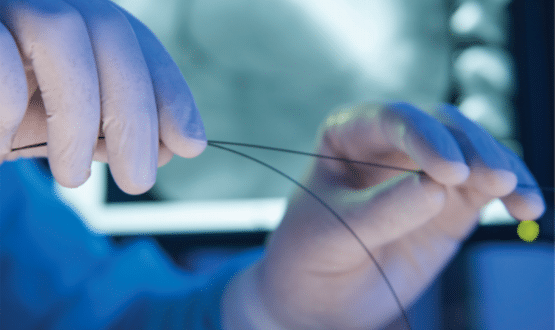New tech for treating cardiovascular disease ‘faces lack of research’
- 14 December 2017

A new generation of medical technology for treating cardiovascular disease could be “just around the corner” according to researchers, however a lack of research threatens to hinder its development.
According to a report from the National Institute for Health Research (NIHR) and Imperial College London, new types of robotics, imaging and implantable technologies are opening up new, minimally-invasive ways of treating patients with diseases affecting the heart and circulation.
It highlights advances in endovascular intervention as an example. Endovascular intervention is a means of treating patients via the blood vessels using steerable catheters. This is significantly more stable and precise than the conventional manual approach, and allows the operator to control the catheters away from the x-ray fluoroscopy system, reducing the risk of radiation.
On top of this, it provides easier access to twisted blood vessels and is more comfortable for patients.
But despite the advancements, additional research is required to make the technologies “smaller, smarter, more affordable and easier to use,” the report said.
Professor Guang-Zhong Yang, CBE, Imperial College London, said that this would only happen with additional funding, which itself was being held back by a lack of clinical studies demonstrating the technologies’ long-term benefits.
Speaking to Digital Health News, Professor Yang said: “Patient research has brought us this far; without it, we would not be using drug-eluting stents for treating coronary artery disease, transcatheter aortic valve replacement for patients who are unable to tolerate the conventional surgical trauma, and patient-specific fenestrated stent grafts for treating complex aneurysms.
“The tech that could define for a generation how we treat people with cardiovascular disease may well be just around the corner, [but] more systematic clinical studies are essential. Research is not a process that should ever stop.”
[themify_box icon=”info” color=”gray”]
New generation of medical technology for treating cardiovascular disease could be just around the corner
· Cardiovascular disease is an umbrella term that describes all diseases of the heart and circulation
· 7m people are estimated to be living with the condition in the UK
· The British Heart Foundation estimates it costs the UK healthcare industry £9bn a year
· New robotics and implantable tech could make treatment less invasive and more cost-effective
· Lack of research into patient benefits is hindering development
[/themify_box]
Unmet clinical needs
According to NIHR, there are approximately seven million people living with cardiovascular disease in the UK, where it is one of the main causes of death and disability.
The British Heart Foundation estimates that the healthcare cost of cardiovascular disease in the country totals £9 billion a year.
Dr John Pepper, national specialty lead for cardiovascular disease at NIHR, claimed more research into “the value and robustness” of new treatment technologies could allow the NHS to “make a dent in the healthcare cost of cardiovascular disease.”
Dr Pepper added: “The potential to improve the quality of life for NHS patients through technology is huge, but it is only through research that we can begin to reap those rewards. Recent advances in robotics have shown their role in deploying endovascular devices, but current systems are expensive, take up too much room in theatre, and in many cases, clinicians require significant training to operate them.”
The report specifically highlighted the need for improved 3D navigation, integrated force feedback and better ergonomics of medical devices to address “the unmet clinical needs in the development of robotic endovascular intervention.”
Professor Yang pointed out that only through patient evidence would new medical devices be adopted into clinical practice. “Academia and industry must work together to ensure the medical devices being developed are clinically applicable,” he said.
“Clinicians who have direct experience in the use of these devices must be involved in the process, otherwise there is a risk in academia for research that doesn’t meet clinical needs.”
The report from NIHR and Imperial College London follows research from the organisations in November, which highlighted the potential of new wearable and implantable devices for people living with chronic lung conditions.



